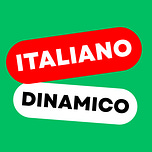Hello there, and welcome to the first lesson of Italiano Dinamico! 🇮🇹
We’re starting our journey with a deep dive into the Mediterranean diet, a topic that’s close to the heart (literally!) of Italian culture and wellness. This isn’t just about food; it’s about a complete lifestyle recognized by UNESCO.
This complete lesson package is designed to boost your Italian skills while giving you fascinating cultural insights. Below, you’ll find the original Italian transcript, the full English translation, a dedicated vocabulary list with detailed explanations, and a comprehension quiz to test what you’ve learned.
Ready to start learning? Let’s go! ✨
La dieta mediterranea: la via del cuore (e della tavola)
Ciao a tutti e benvenuti al primo episodio di Italiano Dinamico! Sono felicissima di avervi qui con me in questo viaggio che ci porterà alla scoperta di ciò che mangiamo, non solo per nutrire il corpo, ma anche per nutrire l’anima. E per inaugurare questo percorso, non potevamo che partire da un pilastro della nostra cultura, un vero e proprio patrimonio dell’umanità riconosciuto dall’UNESCO: la dieta mediterranea.
Quando pensiamo a “dieta”, spesso la prima cosa che ci viene in mente è una restrizione, una privazione, un sacrificio. Ma la dieta mediterranea è tutto il contrario. È un invito a tavola, una festa di sapori, colori e profumi. È un abbraccio caloroso, il ricordo delle nonne che preparavano la pasta in casa, il profumo del pane appena sfornato, il tintinnio dei bicchieri durante un pranzo della domenica. Non è un regime, ma uno stile di vita.
Oltre il piatto: perché la dieta mediterranea è speciale?
Ma perché la dieta mediterranea è così celebrata? La sua fama non è legata a una moda passeggera, ma a decenni di studi scientifici che hanno dimostrato i suoi incredibili benefici per la salute. Parliamo di riduzione del rischio di malattie cardiovascolari, di prevenzione del diabete, di benefici per il cervello e per il nostro umore. È un vero e proprio scudo protettivo, costruito con ingredienti semplici ma potentissimi.
Il segreto sta nella sua semplicità e nella sua ricchezza. Al centro di questo modello alimentare non ci sono cibi esotici o integratori costosi, ma ingredienti che la nostra terra ci offre con generosità:
L’olio extra vergine d’oliva: l’oro liquido della nostra terra, ricco di grassi sani e antiossidanti. È il re indiscusso di questa dieta.
Cereali integrali, legumi, frutta e verdura: la base di ogni pasto. Sono la nostra fonte di energia, fibre, vitamine e minerali.
Pesce: soprattutto quello azzurro, ricco di omega-3, un toccasana per il cuore e per la mente.
Carne: va consumata con moderazione, preferendo quella bianca. Non è il centro del piatto, ma un contorno, un’eccezione.
Vino: un bicchiere di buon vino rosso durante i pasti. Non è un obbligo, ma un piacere da gustare con consapevolezza.
Non solo cibo: il vero cuore della dieta
Ma, come dicevo, la dieta mediterranea non è solo un elenco di cibi. È anche una filosofia. È il piacere di condividere il cibo con la famiglia e gli amici. È il tempo trascorso a tavola, a chiacchierare, a ridere, a raccontarsi la giornata. È il rispetto per le stagioni e per i prodotti locali. È la consapevolezza di ciò che si mangia e da dove proviene.
Pensate al gesto di raccogliere un pomodoro dall’orto, di sentirne il profumo intenso e di gustarlo. Ecco, è quella la vera essenza. Un’essenza che parla di connessione con la terra, con le persone e con noi stessi.
Piccolo invito finale
Quindi, la prossima volta che vi sedete a tavola, non pensate a una dieta. Pensate a un’esperienza. Un’esperienza che vi nutre in ogni senso. E se volete provare a fare il primo passo, iniziate con qualcosa di semplice: un piatto di pasta e fagioli, una bruschetta con pomodoro e basilico fresco, un’insalata coloratissima.
Nel prossimo episodio, ci immergeremo nel mondo del digiuno intermittente. Vi racconterò cos’è, come funziona e se è davvero la soluzione magica che sembra. Non mancate!
Grazie per essere stati con me. Ci sentiamo alla prossima!
Beyond the plate: why the Mediterranean diet is special
So why is the Mediterranean diet so celebrated? Its fame isn’t tied to a fleeting trend, but to decades of scientific studies that have proven its incredible health benefits. We’re talking about a reduced risk of cardiovascular disease, the prevention of diabetes, and benefits for the brain and our mood. It’s a true protective shield, built with simple but powerful ingredients.
The secret lies in its simplicity and richness. At the heart of this eating pattern are not exotic foods or expensive supplements, but ingredients that our land generously offers us:
Extra virgin olive oil: The liquid gold of our land, rich in healthy fats and antioxidants. It’s the undisputed king of this diet.
Whole grains, legumes, fruits, and vegetables: The foundation of every meal. They are our source of energy, fiber, vitamins, and minerals.
Fish: Especially oily fish, which is rich in omega-3, a real blessing for the heart and mind.
Meat: It should be eaten in moderation, with a preference for white meat. It’s not the centerpiece of the plate, but a side dish, an exception.
Wine: A glass of good red wine with meals. It’s not a requirement, but a pleasure to be savored mindfully.
It’s not just food: the true heart of the diet
But, as I said, the Mediterranean diet isn’t just a list of foods. It’s also a philosophy. It’s the joy of sharing food with family and friends. It’s the time spent at the table, chatting, laughing, and sharing stories about the day. It’s respect for the seasons and for local products. It’s the mindfulness of what you’re eating and where it comes from.
Think about the simple act of picking a tomato from the garden, smelling its intense aroma, and tasting it. That’s the true essence. An essence that speaks of connection with the earth, with people, and with ourselves.
A small final invitation
So, the next time you sit down to eat, don’t think about a diet. Think about an experience. An experience that nourishes you in every sense. And if you want to try taking the first step, start with something simple: a bowl of pasta and beans, a bruschetta with fresh tomato and basil, a colorful salad.
In the next episode, we’ll dive into the world of intermittent fasting. I’ll tell you what it is, how it works, and if it’s really the magical solution it seems to be. Don’t miss it!
Thanks for being with me. Talk to you next time!
Lessico del podcast sulla dieta mediterranea
Patrimonio dell’umanità
Translation: World Heritage
Explanation: An official, honorary title given by UNESCO to cultural, natural, or mixed sites or traditions that are considered to have outstanding universal value for humanity. In the text, it serves to highlight the importance and global recognition of the Mediterranean diet not just as a food, but as a culture.
Restrizione
Translation: Restriction
Explanation: A limit or prohibition imposed on something. In the context of a diet, it refers to the act of reducing or eliminating certain foods. The text uses this word to contrast it with the philosophy of freedom and pleasure of the Mediterranean diet.
Abbraccio caloroso
Translation: A warm hug
Explanation: A figurative expression used to describe a feeling of comfort, welcome, and warmth, like the one you get from a real hug. Here, it serves to convey the idea of the Mediterranean diet as something reassuring and pleasant, not as a sacrifice.
Tintinnio
Translation: Clinking/Tinkling sound
Explanation: The light, metallic sound made when two glasses, cutlery, or other glass or metal objects touch. In the text, it evokes the image of a family lunch, with the festive sound of glasses touching for a toast.
Sfornato
Translation: Freshly baked
Explanation: The past participle of the verb “sfornare” (to take out of the oven). It’s used to describe food, particularly bread or pastries, that has just come out of the oven. “Il pane appena sfornato” (the freshly baked bread) evokes a very vivid image and an irresistible smell.
Toccasana
Translation: Panacea / Cure-all
Explanation: A word used to describe something that is a remedy for all ailments, both physical and mental. In the text, it is used to highlight the beneficial effect of omega-3 on heart and mind health. It’s a very common colloquial word in Italian.
Consapevolezza
Translation: Awareness / Mindfulness
Explanation: The ability to be conscious and attentive to what you are doing, feeling, and experiencing. In the text, it refers to the importance of eating mindfully, paying attention to the food, its origins, and the moment of sharing it. It’s a fundamental concept in the philosophy of the diet.
Pilastro
Translation: Pillar
Explanation: The literal meaning is a column that supports a structure. Figuratively, as in this case, it indicates a fundamental element or a principle on which something is based. Here, it refers to the Mediterranean diet as a supporting base of culture and health.
Quiz sulla dieta mediterranea
1. Quale organizzazione ha riconosciuto la dieta mediterranea come Patrimonio dell’umanità?
a) L’Organizzazione Mondiale della Sanità (OMS)
b) L’Organizzazione delle Nazioni Unite per l’educazione, la scienza e la cultura (UNESCO)
c) L’Unione Europea
d) L’Organizzazione delle Nazioni Unite per l’Alimentazione e l’Agricoltura (FAO)
2. Quale sentimento NON è associato al concetto tradizionale di “dieta” secondo l’introduzione del podcast?
a) Sacrificio
b) Privazione
c) Restrizione
d) Condivisione
3. Qual è l’alimento definito “re indiscusso” e “oro liquido” della dieta mediterranea?
a) Il vino rosso
b) Il pesce azzurro
c) L’olio extra vergine d’oliva
d) I cereali integrali
4. A quale categoria di alimenti appartengono i “pilastri” della dieta mediterranea, come indicato dal testo?
a) Cereali integrali, legumi, frutta e verdura
b) Carne rossa e formaggi
c) Integratori alimentari e cibi esotici
d) Dolci e carboidrati raffinati
5. Qual è il principale beneficio per la salute menzionato nel podcast in relazione alla dieta mediterranea?
a) La perdita di peso immediata
b) La riduzione del rischio di malattie cardiovascolari
c) L’aumento della massa muscolare
d) La cura di allergie alimentari
6. Cosa rappresenta la dieta mediterranea “oltre il cibo”?
a) Un regime di allenamento fisico
b) Un’opportunità di guadagno
c) Un’etichetta di lusso
d) Uno stile di vita e una filosofia
7. Cosa viene suggerito di consumare con moderazione?
a) Frutta e verdura
b) L’olio d’oliva
c) La carne, in particolare quella bianca
d) Il pesce
8. L’essenza della dieta mediterranea è legata principalmente a...
a) La quantità di calorie assunte ogni giorno
b) L’uso di cibi esotici e costosi
c) La connessione con la terra e la condivisione
d) Unicamente ai suoi benefici medici
9. Quale bevanda viene menzionata come un piacere da gustare con consapevolezza durante i pasti?
a) Il caffè
b) Il vino rosso
c) L’acqua frizzante
d) Il succo di frutta
10. Quale sarà l’argomento del prossimo episodio del podcast?
a) I benefici del veganismo
b) Il digiuno intermittente
c) Le diete ad alto contenuto proteico
d) I superfood esotici
Soluzioni
b) L’Organizzazione delle Nazioni Unite per l’educazione, la scienza e la cultura (UNESCO)
d) Condivisione
c) L’olio extra vergine d’oliva
a) Cereali integrali, legumi, frutta e verdura
b) La riduzione del rischio di malattie cardiovascolari
d) Uno stile di vita e una filosofia
c) La carne, in particolare quella bianca
c) La connessione con la terra e la condivisione
b) Il vino rosso
b) Il digiuno intermittente
Foto di copertina di Jakub Kapusnak su Unsplash






